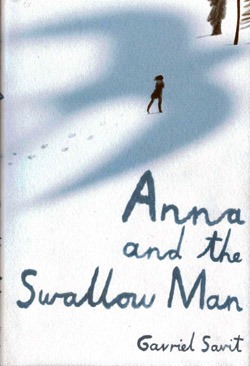Anna and the Swallow Man by Gavriet Savit, Random House Children’s Books, ©2016; fiction; ISBN 978-0-553-51334-9; 230 pages; $17.99.
By Donald H. Harrison

 SAN DIEGO – Here is a fictional story that is both fascinating and improbable. A 7-year-old Jewish girl in Poland is left alone after the Nazis take away her father, a professor of literature who taught her many languages. She encounters a tall, thin man who with a whistle can coax a swallow to land on his person. Not knowing where else to go, the orphan Anna follows the thin man into the forest. He is fearful of both the Nazi Germans and the Soviet Communists who face each other across a river in Poland. Accepting Anna into his company, he declines to tell her his name, saying the easier it is for people to identify you, the easier it is for them to catch you. She thinks he is wise like the biblical Solomon. With a play on words, he says she can call him the “Swallow Man” and he will call her “Sweetie.”
SAN DIEGO – Here is a fictional story that is both fascinating and improbable. A 7-year-old Jewish girl in Poland is left alone after the Nazis take away her father, a professor of literature who taught her many languages. She encounters a tall, thin man who with a whistle can coax a swallow to land on his person. Not knowing where else to go, the orphan Anna follows the thin man into the forest. He is fearful of both the Nazi Germans and the Soviet Communists who face each other across a river in Poland. Accepting Anna into his company, he declines to tell her his name, saying the easier it is for people to identify you, the easier it is for them to catch you. She thinks he is wise like the biblical Solomon. With a play on words, he says she can call him the “Swallow Man” and he will call her “Sweetie.”
And so, they start tromping through the Polish woods, never resting anywhere longer than a night, leaving as few traces of themselves as possible. There are long periods of silence between “Swallow Man” and “Sweetie,” but he tells her that their constant march, even though it often is in circles, is necessary to save the birds from the Wolves and the Bears. The Wolves in his parlance are the Nazi Germans; the Bears the Russian Communists; and the Birds, one assumes, are Sweetie and Swallow Man themselves.
Although their existence of walking, walking, and walking is monotonous, theirs is a fortuitous pairing. As much as “Swallow Man” is “Sweetie’s” protector, so too is she part of his disguise. To the casual eye, he seems a respectable gentleman out for a walk with his beautiful—and very Aryan looking—daughter.
Under his tutelage, Anna learns that for the purpose of survival, and to mask her identity and the vagabond nature of their lives, it is okay for her to mislead, prevaricate, and lie. Appealing to her love of languages, “Swallow Man” tells her she is not really lying, she is just speaking another language – the “Road” language.
Although they try to keep out of sight, sometimes the results of war do not escape their own vision. They come across people—most probably Anna’s fellow Jews—who have been massacred in the woods; and they also see the bodies of Wolf and Bear soldiers. “Sweetie” learns how to quickly forage in the soldiers’ knapsacks and pockets to harvest anything that will help their survival.
Some important personages enter the lives of Anna and the Swallow Man. There is an Orthodox Jewish musician, who holds tightly onto his clarinet though it has no reed; a peddler, whose pack is stuffed with items for trade and whose heart is filled with malice; and a pharmacist who is a pedophile. Because of his loving heart, “Sweetie” loves the musician, however impractical and foolish he may seem. She rightly fears the peddler, whom she identifies as an existential threat to both her and the Swallow Man. And she is shamefully exploited by the pharmacist who requires her to stand naked in front of him before he will give to her pills that Swallow Man needs.
Not only the naked scene, but the lesson the book teaches about survival in a world without morals may give parents pause about whether they want their impressionable children to read this story. Lying, stealing from dead people, even killing in self-defense, much less taking off one’s clothes, are justified on the grounds of survival. We must hasten to add, however, that there is counter point in this book. The klezmer musician wants no part of such immoral behavior; for him, his integrity and adherence to moral codes are more important than life itself.
*
Harrison is editor of San Diego Jewish World. He may be contacted via donald.harrison@sdjewishworld.com. Comments intended for publication in the space below must be accompanied by the letter writer’s first and last name and by his/ her city and state of residence (city and country for those outside the U.S.)